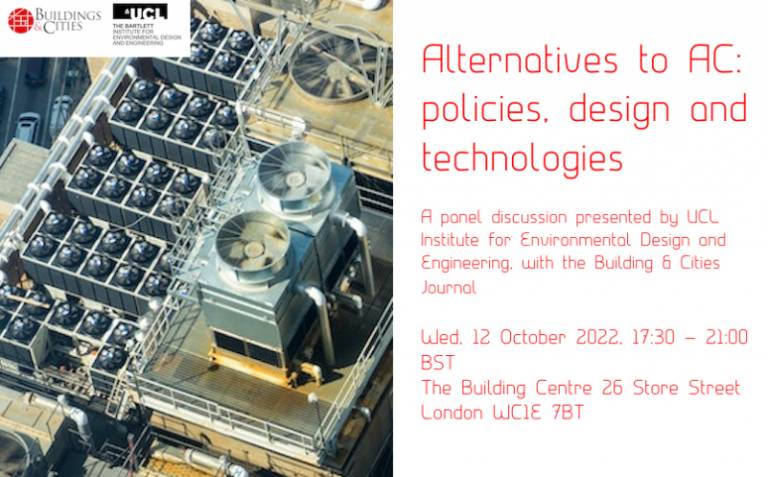Alternatives to air-conditioning: policies, design, technologies - Panel Discussion
12 October 2022, 5:30 pm–9:00 pm

The UCL Institute for Environmental Design and Engineering presents a panel discussion to explore alternatives to air-conditioning, covering future policies, design, technologies and behaviour.
Event Information
Open to
- All
Availability
- Yes
Organiser
-
BSEER Communications team
Location
-
Foyer (Reception and Registration)The Building Centre26 Store StreetLondonWC1E 7BTUnited Kingdom
Join us for a UCL panel discussion exploring explore alternatives to air-conditioning, covering future policies, design, technologies and behaviour
In a world getting hotter, what policies, designs, technologies & behaviours can provide thermal adequacy for cooling in the built environment? Buildings and cities have become highly dependent on air-conditioning and mechanical ventilation. Without significant intervention demand for air-conditioning (AC) is projected to rise by 700% by 2050. The implications of an unsustainable increase in cooling demand are being recognised in many countries around the world. Recent discussions about ‘Build back better’ after the Covid-19 pandemic afford an opportunity to reconsider many contemporary practices in the built environment: health and wellbeing, thermal comfort and the agency of building occupants, adaptation to climate change, energy use and environmental impacts, economics and equity, social expectations and demographics, design and innovation, thermal characteristics of buildings and cities. In addition, many countries have stipulated that new buildings must be carbon neutral. Climate change will create an increasingly warmer world – impacting on summer overheating in buildings. This is an urgent concern for both mitigation and adaptation: how can thermal comfort be provided during hotter summers without the GHG emissions? ‘Conventional’ air conditioning will soon be technologically redundant: can our cities and buildings be designed to have little or no mechanical intervention?
UCL's Institute for Environmental Design and Engineering is at the forefront of research and engagement in the built environment. We pursue a deeper understanding of the interactions between the built environment and health, human wellbeing, productivity, energy use and climate change. We are part of The Bartlett, UCL's global faculty of the built environment.
This discussion will bring together experts in the field to discuss cooling in the built environment of the near-future, and will accompany the publication of an associated special issue of 'Building & Cities' journal which you can find here. *N.B. please note that the views of the journal and the panel are not necessarily reflective of each other. Panel details:
Chair: Prof Dejan Mumovic, Professor of Building Performance Analysis
Moderator: Emeritus Professor Brian Ford, Nottingham University
Panellists:
Kevin Mitchell - CIBSE President and Global Practice Leader for Building Services Engineering at Mott MacDonald, UK
Sheila Hayter - Past ASHRAE President, NREL Laboratory Programme Manager for the U.S. Department of Energy Federal Energy Management Program, USA
Professor Rajan Rawal - CEPT University, India (remotely)
Professor Mike Davies - UK Climate Change Committee, UK
Registration: 5.30-6pm
Talks and Panel discussion: 6-8pm
Reception: 8-8.50pm
Find the Building Centre here.
For access information, please click here.
Presented in partnership with:

Photo credit: Sergei A / pexels.com
 Close
Close

